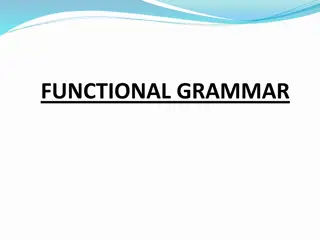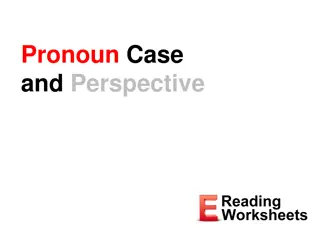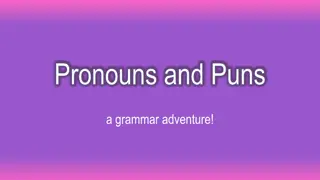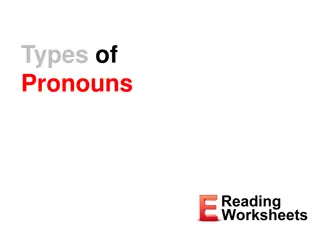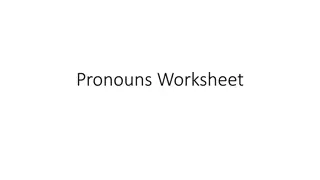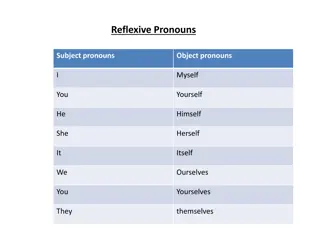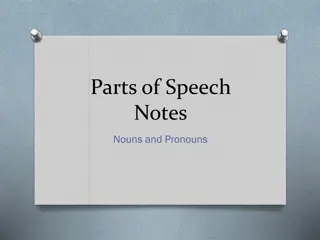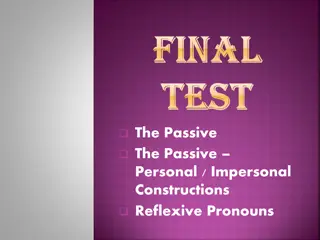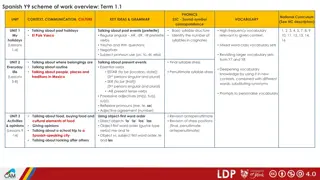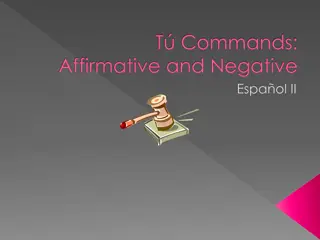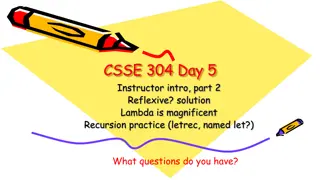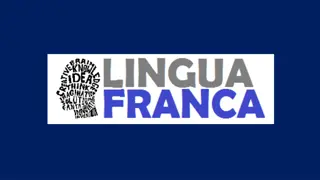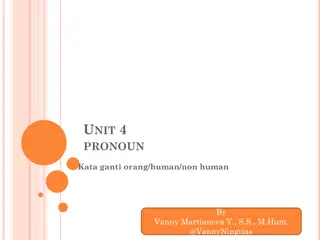Verbal Voices in Grammar
Verbal voices in grammar determine whether the subject performs or receives the action expressed by the verb. They can be active, passive, or reflexive, each serving a unique purpose in sentence construction. By examining examples and distinctions between active and passive voices, one can grasp the
1 views • 13 slides
Ethnographic Fieldwork and Writing Techniques
Dive into the world of ethnography with a comprehensive guide covering topics such as participant observation, working with informants, reflexive approaches, and more. Discover the ins and outs of conducting fieldwork, writing ethnographic studies, and developing a reflexive approach in your researc
0 views • 27 slides
JENIS-JENIS RELASI
Exploring various types of relations in mathematics such as reflexive, symmetric, transitive, and equivalence relations with examples. Understand the definitions and properties of each type to enhance your comprehension of mathematical concepts.
2 views • 10 slides
Pronoun Placement Rules in Spanish Sentences
Clear up confusion around the placement of reflexive, direct object, and indirect object pronouns in Spanish sentences and commands. Learn the placement rules for different types of pronouns in statements and commands, including examples for single-verb and two-verb sentences. Understand the order o
2 views • 10 slides
Functional Grammar: Nouns, Pronouns, and Punctuation
Functional grammar involves understanding the parts of speech, such as nouns and pronouns, along with proper punctuation usage. Explore the different kinds of nouns like proper, common, collective, material, and abstract. Learn about the various types of pronouns including personal, reflexive, relat
0 views • 39 slides
Individualizing Treatments for Reflexive Conditioned Motivating Operation
Understanding the importance of individualizing treatments for escape/avoidance behaviors in individuals with ASD. Factors such as behavior change speed, alternative repertoires, and aversive stimuli considerations are crucial for effective intervention. Generic interventions may not address behavio
1 views • 47 slides
Pronouns: Cases, Perspectives, and Usage
Explore the nuances of pronouns including cases, perspectives, and correct usage to enhance your language skills. Learn about subjective, objective, and reflexive pronouns, as well as how to choose the right pronoun based on the context. Enhance your command of standard English grammar and usage wit
0 views • 15 slides
Survival Strategies and Risks in Cold Water Immersion and Hypothermia Scenarios
Explore the critical information on cold water immersion and hypothermia, including severity levels, thermal regulations, and survival tips. Understand the dangers of reflexive gasp, stages of incapacitation, and the crucial 10 minutes window for purposeful movement. Learn how to differentiate betwe
0 views • 30 slides
Fun with Pronouns and Puns in Grammar
Explore the world of pronouns with humor while learning about personal pronouns and reflexive pronouns. Test your knowledge with interactive exercises and witty examples. Get ready for a grammar adventure filled with wordplay!
0 views • 12 slides
Different Types of Pronouns
Learn about the seven types of pronouns - Personal, Possessive, Reflexive, Relative, Demonstrative, Indefinite, Interrogative. Personal pronouns replace nouns, possessive pronouns replace possessive nouns, reflexive pronouns refer back to the subject, relative pronouns introduce relative clauses, an
0 views • 16 slides
Mastering Reflexive Pronouns in Writing
Understand the importance of reflexive pronouns in writing, including examples of correct and incorrect usage. Learn why reflexive pronouns should not replace personal pronouns and how to use them effectively for clarity and precision in your writing. Enhance your writing skills by mastering the use
0 views • 6 slides
Pronouns: Complete Worksheet for Practice
This detailed worksheet provides comprehensive information on subject pronouns, object pronouns, possessive adjectives, possessive pronouns, and reflexive pronouns. It includes examples and exercises to help you understand and practice using pronouns correctly in sentences.
0 views • 15 slides
Reflexive Pronouns and Their Usage
Reflexive pronouns, such as myself, yourself, himself, herself, itself, ourselves, yourselves, and themselves, are used to show that the subject of a sentence is also the object of the action. They are employed for emphasis and in certain expressions like "enjoy yourself" or "help yourself." Through
0 views • 8 slides
Nouns and Pronouns in Grammar
Dive into the world of nouns and pronouns with this comprehensive guide. Learn about different types of nouns such as concrete, abstract, collective, and compound nouns. Explore the distinction between common and proper nouns. Discover the role of pronouns as words that substitute for nouns, includi
0 views • 7 slides
Passive Constructions and Pronouns Practice
Enhance your understanding of passive constructions, reflexive pronouns, and impersonal structures with interactive exercises. Practice transforming sentences from active to passive voice, rewrite sentences, and utilize impersonal constructions to master language skills effectively. Test your knowle
1 views • 7 slides
Spanish Year 9 Scheme of Work Overview: Term 1 Phonics and Communication Units
Explore the Term 1 scheme of work for Spanish Year 9, focusing on phonics, communication, and culture. The overview includes topics such as talking about past holidays, everyday life, activities, opinions, sports, healthy living, weekends, and school traditions. Students will learn grammar concepts
0 views • 7 slides
Mastering T Commands in Spanish
Learn how to form affirmative and negative T commands in Spanish, including irregular forms and reflexive verbs. Understand the rules and exceptions for creating commands to communicate effectively in Spanish. Improve your command of the language with practical examples and tips for each type of com
0 views • 8 slides
Pronouns: Types and Usage in English Grammar
Delve into the world of pronouns with this comprehensive guide covering definitions, types, and examples of personal, demonstrative, interrogative, relative, indefinite, distributive, reflexive, emphatic, and reciprocal pronouns. Explore how pronouns function as essential parts of speech in English
0 views • 6 slides
Mastering Pronoun Case: Essential Tips and Tricks
Learn about the four cases of pronouns in English - subjective, objective, reflexive, and possessive. Discover six essential tips and tricks to handle pronoun usage effectively, from using "who" and "whom" correctly to understanding when to remove or substitute information. Improve your grammar skil
0 views • 10 slides
Introduction to Lambda in Scheme Programming
Explore the power of Lambda in Scheme programming through reflexive solutions, recursion practice, and creating curried procedures. Learn how procedures can be first-class data objects and try hands-on exercises like writing the largest-in-lists code using letrec and named let. Pair programming and
0 views • 6 slides
Challenging Conventions in New Media Research: Ethical Reflexivity and Social Media Data Collection
Dr. Filippo Trevisan explores the ethical complexities of conducting research in new media, focusing on discipline-grounded reflexive practices. He questions traditional conventions in social media data collection and emphasizes the importance of safeguarding participants' voices while navigating se
0 views • 5 slides
Disability, Reflexive Representations in Genre Fiction: Exploring Cultural Perspectives
Disability studies, a vital academic discipline, delves into societal perceptions and policies around disability, challenging norms through evaluative and positive-image approaches. This exploration includes cultural analysis, critical assessments, and nuanced representations in genre fiction, offer
0 views • 18 slides
Phenomenology for Reflexive Practice-Based Learning
This paper delves into the integration of phenomenology into educational practices to enhance reflective teaching and learning. It highlights the importance of reflective practice in tailoring learning processes for students and teachers, advocating for a systematic and disciplined approach that con
0 views • 17 slides
Pronouns: Types and Usage
Pronouns are vital elements in language that replace nouns to avoid repetition and make sentences concise. They include personal, possessive, reflexive, intensive, indefinite, demonstrative, relative, interrogative, and reciprocal pronouns. Personal pronouns serve as subjects (e.g., I, he, she) or o
0 views • 18 slides
Pronouns and Possessives in English Grammar
Explore the various types of pronouns and possessives in English grammar, including personal pronouns, possessive adjectives, possessive pronouns, reflexive pronouns, and relative pronouns. Learn how to use them correctly in sentences and understand their roles in different contexts.
0 views • 20 slides
Learn Reflexive Verbs in Pennsylvania Dutch
Explore reflexive verbs in Pennsylvania Dutch, also known as "Sich Verbs." Understand the concept of reflexive pronouns, common reflexive verbs, and practice building sentences. Enhance your understanding of sentence structure and usage in PD for effective communication.
0 views • 9 slides
RDF Schema: A Deep Dive into Semantic Web
In this detailed exploration of RDF Schema, Dr. Nicholas Gibbins covers topics such as defining classes and properties, subclass relationships, semantic implications, reflexive properties, type distribution, and property definitions in RDF. Learn about the essential aspects of RDF Schema and its rol
0 views • 19 slides
Equivalence Relations and Partitions
Equivalence relations are essential in mathematics for understanding relationships between various elements within a set. This content explores reflexive, symmetric, and transitive relations, along with examples demonstrating the concept's application. Discover the significance of partitions in defi
0 views • 5 slides
More Relations
Concepts of relation composition, inverses, reflexive, irreflexive, symmetric, and antisymmetric relations through examples and definitions. Discover how these properties apply in different scenarios and learn about the graphical representations of reflexive and irreflexive relations.
0 views • 16 slides




